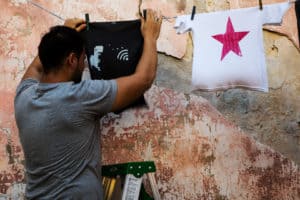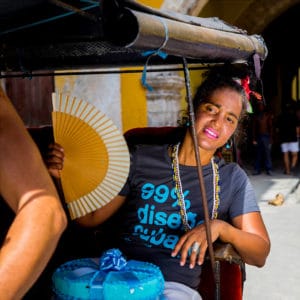Amid the candy-colored Spanish colonial-style facades and vintage cars lining the streets of Old Havana, there is a digital awakening occurring that belies the frozen-in-time appearance of the communist Caribbean island.

Idania del Río, co-founder of Cuban fashion brand Clandestina
Nearly a year ago, one designer found a way to take her hip, local apparel brand—popular with the burgeoning tourist set as well as homegrown residents—worldwide, despite decades of Cuba’s isolation from global markets. In October 2017, Idania del Río’s Clandestina label became the first Cuban brand to sell online—even to the United States.
The move took some finagling, with del Río and co-founder Leire Fernández finding a loophole to sidestep U.S. legislation. Restrictions make the imports from Cuba nearly impossible and very costly, but the duo spent the last several years researching how to get around the embargo. They discovered that the Office of Foreign Assets Control, a U.S. agency that administers and enforces economic and trade sanctions, makes a distinction between the sale of physical products versus services to U.S. customers.
“The law is a little different now, and OFAC allowed some independent Cuban activities—especially ones related to creative industries like design, tech, art… and that’s our gateway,” Fernández says.
The brand’s online products are designed in the Havana studio with digital images uploaded for a manufacturer in South Carolina to screen print on T-shirts from a supplier in Nicaragua. The American manufacturer can then ship to consumers in the United States and abroad. Clandestina—which translates to hidden, forbidden or illegal—is known for its statement-making T-shirts. Del Río says the brand’s most famous graphic T-shirt reads, “Actually, I’m in Havana,” with more than 100 online orders to date for the label’s best-selling product.
Reaching a milestone
The retailer will celebrate its first year online later this month, and the founders are eager to assess its e-commerce growth.
When Clandestina.co launched, the e-commerce site listed a limited inventory of only six designs available in a few colors. Now, the web offerings have more than doubled to more than 15 T-shirt designs in addition to posters, caps, phone cases and towels. The creative team plans to expand with more products in the works—four of which will be available before the end of the year.
“2018 for us has been a year of experimentation,” says del Río, who studied graphic design and serves as the company’s creative director. “We have focused on moving forward despite all the obstacles or uncertainties that have arisen along the way. And we believe that we have done it quite well.”
Stifled entrepreneurship
Cuba’s export market is virtually non-existent, having been crushed by the longstanding U.S. embargo. That economic reality—coupled with a repressive regime and limited resources—had largely stifled innovation and entrepreneurship in the country.
Relations between the United States and Cuba have been contentious since Fidel Castro overthrew a U.S.-backed authoritarian ruler in 1959 and established a socialist government with ties to the Soviet Union. Until recently, U.S. administrations have severely isolated Cuba through diplomatic and economic sanctions as well as travel restrictions, according to the Council on Foreign Relations, a nonpartisan think tank specializing in U.S. foreign policy and international affairs.
During President Barack Obama’s time in office, he normalized the United States’ relationship with Cuba by restoring full diplomatic ties and easing financial and travel restrictions after meeting with Raúl Castro, who replaced his brother as the Cuban leader in 2008, according to the CFR. Raúl Castro was more receptive to reform and began loosening the laws governing private enterprise and modernizing Cuba’s state-controlled economy. The CFR says the country’s private sector swelled as a direct result, and the Cuban government estimates that the number of self-employed workers nearly tripled from 2009 to 2013.

A Clandestina employee rescreens second-hand T-shirts.
With the thawing of U.S.-Cuba relations and a wave of entrepreneurial spirit sweeping the country, independent businesses began springing up. It was against this backdrop that del Río founded Clandestina in 2015—making her a poster child for the fledgling private sector and the ingenuity of determined local business owners dealing with the insular nature of commerce in Cuba and perpetual supply shortages.
Materials for Clandestina’s in-store stock are hard to come by—ink and buttons but especially fabrics are treasures. With a scarcity of textiles available in the country and bans on importing, del Río and her crew instead have reworked used T-shirts, many of which are hand-me-down discards from the United States with faded, semi-visible brand logos, by re-screening designs.
The flagship store in Old Havana sees more than 20,000 visitors—mainly American vacationers—each year, according to the company. But the influx of tourists and infusion of dollars may be temporary. President Donald Trump reinstated some travel and trade restrictions that were eased by the Obama administration, and the CFR says Raúl Castro’s successor, President Miguel Díaz-Canel, took office in April 2018 as a known hard-liner who’s not likely to play ball with the United States. Despite the ambiguity of the future and potential interruptions to growing their business, del Río and Fernández have forged ahead and explored the new frontier of e-commerce.
‘A little nightmare’
The last 12 months have been a period of trial and error as the Clandestina team has familiarized itself with e-commerce and the platforms and technology required to manage all of the moving parts. Challenges crop up daily.
“When we least expect it, any service we use becomes banned for Cuba due to the embargo, and we have to find an immediate solution,” del Río says. “You can wake up any morning and realize that we are now prevented from accessing websites blocked by the United States—it just slows you down.”
Employees have to use virtual private networks for almost everything—sometimes even using VPNs to access other VPNs. The service is used for secure communication over the public internet and can encrypt data traffic and disguise a user’s location to skirt censorship or geographic online restrictions. Just a couple months ago, Cuban IPs were blocked from access to Shopify, Clandestina’s e-commerce platform, which left the team scrambling. Staffers had to start using a VPN just to access the online store admin page.
Fundamental business tools as basic as internet access—which other e-commerce players in developed countries take for granted—aren’t a given in Cuba. Clandestina calls the task of managing online retail from the brand’s home country “a little nightmare.” Internet wasn’t available in Cuba until 2015, when the government initiated the first public Wi-Fi hotspots. Even today, signals are unreachable for most average citizens trying to browse from home. For the first three months after Clandestina launched its site on Oct. 26, 2017, del Río had to run the online store from hotspots around the city. Luckily, in January 2018, the park on the corner near the Havana shop became a Wi-Fi zone, and she started getting a signal from her office.
Even so, Wi-Fi is expensive, and the connection is highly inconsistent and painfully slow, leaving the team less connected to the outside world, less informed and, as a result, less competitive than they’d like to be, says Fernández. This reality has curbed the retailer’s ability to scale business at a pace that’s in line with the growing demand for the label’s designs.
There are other logistical difficulties, too. Shipping to the European Union has been problematic because of some red tape. And although Clandestina products for online orders are manufactured in the United States, test products still have to return to Cuba for quality checks and marketing photos, which is a struggle without a “proper” postal service there, del Río says. She and Fernández have resorted to flying overseas to pick up inventory or relying on a wide network of traveling friends to fill in as personal couriers by retrieving and delivering their shipments.
Attracting the ethical fashion shopper
The Cuban retailer says more than a quarter of its patrons are repeat buyers, and Clandestina is growing its network of fans who eagerly await each new product release. “That comforts us a lot,” says del Río, who declines to disclose the company’s revenue. “We believe we have created an audience that is quite committed to the brand.”
Early in 2018, Clandestina’s “Actually, I’m in Havana” slogan had already gained enough traction that unauthorized sellers were listing knockoff T-shirts on Amazon—a bittersweet realization for the retailer. So, in late April, the team opened up its own Amazon storefront.

Clandestina sells statement-making T-shirts like this one, which translates to “Resist, overcome.”
Clandestina’s target demographic skews young, and Fernández says most shoppers are interested in “conscious and ethical” fashion. Somewhere around half of the apparel merchant’s customers are from the United States, and the team says it has attracted buyers in countries far removed from Cuba both geographically and culturally. The retailer has fulfilled orders sent to Japan, Korea, Australia and New Zealand.
According to Clandestina, the online store receives around 4,000 total monthly visits, a number that’s been stable over time. But the founders say they need to get many more people navigating to the site and are concentrating on generating more traffic.
The team plans to dedicate more efforts to attracting visitors, including posting more social media content and working with influencers, among other strategies. Clandestina is one of the few businesses in Cuba with a marketing team, but the retailer says the unit is small and comprised of novices. Since none of the members are specialists in the field yet, they continue to study up on branding tactics each day.
Yet a lack of expertise hasn’t discouraged Clandestina from tackling ambitious projects. One such initiative is “País en Construcción,” meaning “Country in Construction,” a Google-inspired runway show set for November, representing a before-and-after view of the evolving brand. Several lines, which will be showcased on a Havana catwalk, will feature pieces from del Río and fellow designers Celia Ledón and Gabriel Lara that are influenced by the discordant juxtaposition of “connectivity in Cuba” and “the moment that our country is currently living.”
The collection has special significance for Clandestina and its expansion as a design house. “It means a transition from that souvenir shop we were at the beginning to a bigger brand that aspires [to establish] a position worldwide,” del Río says.

Clandestina uses locals—not professional models—in its product images.
The models will be “real people from the streets of Cuba,” she says—a differentiator for the gritty brand and a habit it employs for the models on its site, too.
Website redesign
The runway show also has been the impetus for a website redesign, with updates expected to go live by the end of the week. Clandestina wants its online presence to serve as more than a shop. The team sees the site as a link between the brand and the Cuban community, so it aims to use its web presence to spotlight local projects it’s developing and other activities with an impact on its audience. Clandestina plans to devote a section on its new site to social events and collaborations.
Although the online “About us” section already offers a robust origin story, the redesigned site also will present more of a peek behind the brand. Visitors will get a tour of the Clandestina shop in Old Havana, the workshop in Cayo La Rosa and the team’s “Cuevita,” or little cave, in the Fábrica de Arte Cubano, an art gallery and club in Havana.
Additionally, the new site will debut offer a better customer experience, including updates to improve the checkout process and facilitate user interactions.
“Until now, we have managed to solve everything. The embargo is a real thing and is a headache for every Cuban,” del Río says. “But we try, as a Cuban philosophy, to ‘resolver.’” The term means resolve.
That problem-solving mantra is echoed in another Clandestina T-shirt slogan: “Resistir, Vencer,” or resist, overcome. Not a bad fit for a scrappy Cuban business with its eyes set on playing in the big league.
Favorite